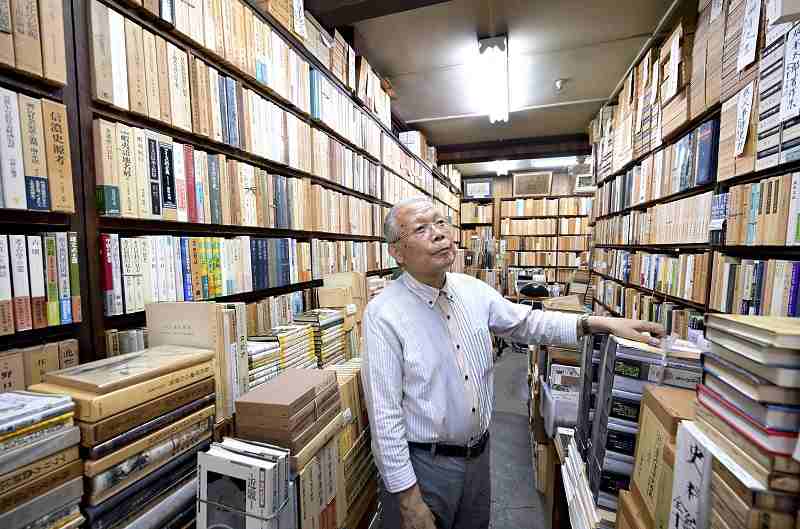Kyoto bookstore loved by great writers closes

Saburo Sakakura looks at books at Keihan Shobo in Nakagyo Ward, Kyoto, before the closure of his store in June. | The Yomiuri Shimbun
TOKYO — A Kyoto used bookstore loved by writer Junichiro Tanizaki (1886-1965) closed its doors in June. Its customer base has dwindled due mainly to the spread of the novel coronavirus, though the general shift away from reading books has also impacted its bottom line.
Keihan Shobo, situated in a busy shopping district in Kawaramachi, Kyoto, has provided students and intellectuals with a place to discover books for more than 90 years.
“I will miss this bookstore that expanded my world,” one of its regular customers said.
Keihan Shobo, which is located on a corner crowded with tourists, mainly handles academic books on philosophy, history and religion.
Shozaburo Sakakura who had been a head clerk at another used bookstore, went independent and founded Keihan Shobo in around 1928.
Article continues after this advertisementWhen Tanizaki lived in Kyoto for many years, he was a frequent visitor to the bookstore, which maintained a collection of valuable books on the humanities and history.
Article continues after this advertisementIn his diary dated May 29, 1960, Tanizaki writes that he stopped by Keihan Shobo to look for “Kinkoshidan,” a history book written in the Edo period (1603-1868). He had a meal at Tankuma, a local restaurant, and the owner of the bookstore, who had found the book, came to bring it to him before he went home, he writes.
In this way, the bookstore’s name came to appear many times in his diary.
Writer Shotaro Ikenami (1923-90) is also said to have been a regular customer of the bookstore.
Saburo Sakakura, ran the business as the third-generation owner. During the bubble economy, he was approached by a real estate agency that offered to buy the property for ¥100 million per tsubo, or roughly the area of two tatami mats. However, he kept refusing the proposal, saying that it would be unfair to his ancestor.
Ryu Shimada, a research fellow at Ritsumeikan University specializing in Japanese history, said he bought an academic book at the store for the first time when he was a student.
“When I bought the book, I felt the ‘passion of learning.’ That was my starting point,” he said.
Akio Takei, a professor emeritus at Doshisha University who has been a regular customer for 50 years, expressed his regret over the closure of the store. “This store was like a university where I could learn all the time but never graduate,” he said.
Sakakura said it had become physically demanding to continue operating the store due to his advancing age.
“I have met many customers through books. I have nothing but gratitude,” he said.
RELATED STORIES
Kyoto’s love-hate relationship with tourists endures as yen weakens
Japan deals with ‘tourist pollution’ from surges in visitors
Pack your bags for Lonely Planet’s top 30 travel destinations of 2022
LOOK: Angel Locsin, Neil Arce witness quaint beauty of Kyoto, Japan
For more news about the novel coronavirus click here.
What you need to know about Coronavirus.
For more information on COVID-19, call the DOH Hotline: (02) 86517800 local 1149/1150.
The Inquirer Foundation supports our healthcare frontliners and is still accepting cash donations to be deposited at Banco de Oro (BDO) current account #007960018860 or donate through PayMaya using this link.